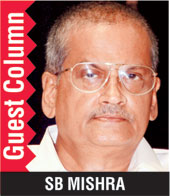
The sudden decision of the state government to establish a legislative council and thus have a bicameral legislature has taken everyone by surprise. The ruling establishment seems to be in a hurry. A five-member committee has been constituted with three legislators from the BJD and one each from the Congress and the BJP. They will visit some states where the Upper House has been functioning and submit their views to the government. The intention seems to get the proposal through in the coming budget session of the Assembly. The parliamentary affairs minister has defended the initiative as fulfilment of a 'long-standing demand of the people'.
Predictably, the Opposition is not buying the idea. The Congress says that it had been advocating for the council for quite sometime and had brought proposals in the state legislature thrice during the past five years. Every time, the BJD government had turned it down. The Congress feels that the sudden enthusiasm of the ruling party is a desperate effort to rehabilitate its disgruntled leaders. The BJP, too, says that the move is initiated to stall the exodus of disenchanted leaders of the ruling party to the BJP.
The Opposition finds no justification in creating another legislative forum when the state Assembly is not allowed to meet for the mandated 60 days every year. The Congress and the BJP have refused to be part of the committee and called for wider consultations at an all-party meeting. The government, however, seems determined to push ahead. It will be a cakewalk for the ruling party, with its overwhelming majority, to get the proposal through in the Assembly. The proposal has to be passed by Parliament and receive the formal approval of the President before the legislative council or the Vidhan Parishad comes into being.
At present, seven states (Uttar Pradesh, Bihar, Maharashtra, Karnataka, Andhra Pradesh, Telangana and Jammu and Kashmir) have bicameral legislature. Assam has received the sanction for an Upper House recently. In Andhra Pradesh, the council was abolished, but later reintroduced. The Telugu Desam Party government, which is now ruling the state, wants to do away with it again. Tamil Nadu, too, had abolished the council. However, in 2010, its reconstitution had received legislative approval, but is pending due to technical reasons. In Bengal, the ruling Trinamul Congress wants to bring back the council, which had earlier been abolished. Thus the attitude to the bicameral legislature has varied from state to state and time to time.
The strength of the Vidhan Parishad is limited to one-third of the total membership of the Vidhan Sabha. For Odisha, the maximum number will be 49. These members will be elected from different constituencies - members of zilla parishad and urban local bodies, university, college and secondary teachers, graduates and members of the Assembly. Besides, the governor has the powers to nominate some members proficient in arts, science, literature, social service and cooperative movement. The underlying objective of the council is to provide representation to seasoned wisdom and mature expertise in legislative and policy-formulation process. Non-partisan civil society leaders, who cannot enter legislature through direct election, can get into the Vidhan Parishad and make useful contribution to governance.
While considering the desirability of constituting the Upper House in the state, two issues deserve consideration. The first is the quality of membership. Profiles of many members in the legislative council of states are found unflattering. Political bigwigs who lost elections, close relatives and associates of party supremos, young sportsmen and artistes often make it to the council. Clearly, with such composition, the second chamber will not be a repository of wisdom, maturity and professionalism it is required to disseminate. It defeats the basic purpose and rationale for a second House.
The second issue is about cost. In Odisha, over Rs 50 crore is spent on the legislative Assembly every year. The average per day sitting cost is estimated to be Rs 50 lakh. Today, the state's financial situation is not comfortable. Funding for centrally sponsored projects to the state including flagship schemes such as Sarva Shiksha Abhiyan, Pradhan Mantri Gram Sadak Yojana and National Rural Health Mission may be curtailed by nearly Rs 5,000 crore this year due to financial constraints.
Low collection of central taxes due to economic slowdown may reduce the state's share by over a thousand crore rupees. The state's own collection of tax and non-tax revenue will fall short by Rs 4,000 crore. Quite a few populist programmes have been launched by the state requiring vast outlays. As such financial prudence and discipline is the need of the hour, budget experts opine that this is not the best time to constitute the legislative council and impose substantial additional burden on the state exchequer.
(The author is a former chief secretary of Odisha)










